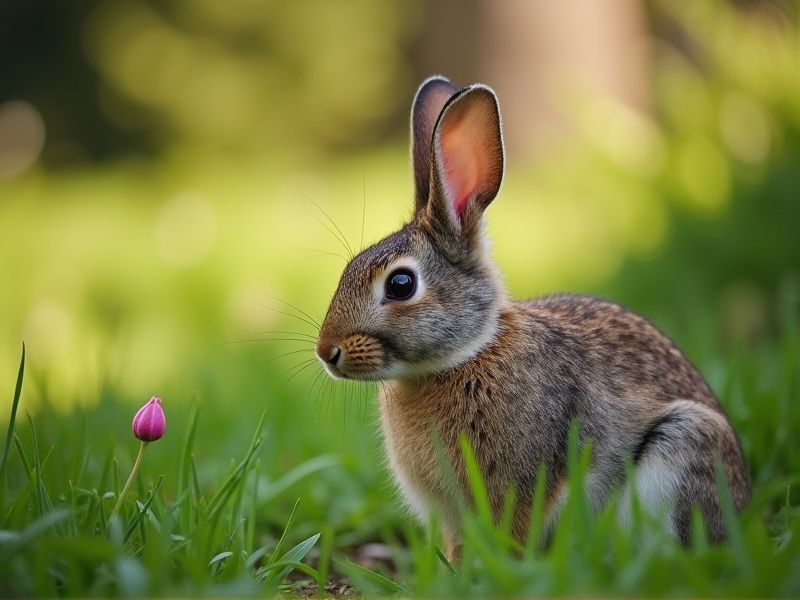
Consider planting marigolds, as their strong scent deters rabbits while adding vibrant color to your garden. Lavender, with its fragrant foliage, is another excellent choice that not only repels these pests but also attracts beneficial pollinators. Opt for herbs like rosemary and sage, which are both aromatic and resilient, making them less appealing to rabbits while enhancing your culinary options. For a touch of greenery, plant ornamental grasses such as fescue or blue oat grass, which are unpalatable to these animals. These strategic selections ensure your garden flourishes without the nuisance of hungry rabbits.
List of some Garden plants that resist rabbits
- Lavender (Lavandula)
- Marigold (Tagetes)
- Catmint (Nepeta)
- Peony (Paeonia)
- Salvia (Salvia)
- Yarrow (Achillea)
- Bleeding Heart (Dicentra)
- Daffodil (Narcissus)
- Foxglove (Digitalis)
- Allium (Allium)
Important things about Garden plants that resist rabbits
Selection Of Native Plants
Choosing native plants that resist rabbits can significantly enhance your garden's resilience and biodiversity. Native species like coneflowers, lavender, and salvia are both beautiful and unappealing to these herbivorous pests, providing vibrant colors while reducing the likelihood of rabbit damage. Incorporating these plants into your landscape not only supports local ecosystems but also minimizes the need for chemical repellents. By selecting these hardy options, you can create a thriving garden that flourishes in harmony with nature.
Use Of Strong Scents
Planting strong-scented garden plants can effectively deter rabbits from invading your floral sanctuary. Aromatic herbs like rosemary, basil, and lavender emit potent fragrances that these fur-covered intruders find unappealing. Incorporating strongly scented flowers such as marigolds or sage can enhance your garden's aroma while keeping rabbits at bay. By selecting these fragrant options, you create a more resilient garden that thrives without the threat of unwanted nibblers.
Thorns And Spines
Plants with thorns and spines serve as natural deterrents against rabbits, making them ideal choices for your garden. Species like the Barberry (Berberis spp.) and the Pyracantha, also known as Firethorn, feature sharp spines that not only enhance their aesthetic appeal but also protect them from herbivorous pests. Additionally, certain succulents, such as Sea Urchin Cactus (Echinocactus spp.), provide a formidable barrier, thanks to their dense spines that discourage nibbling. Incorporating these thorny varieties into your landscape can create a beautiful yet resilient environment that thrives in the presence of browsing rabbits.
Toxic Plants
Incorporating toxic plants into your garden can be an effective strategy for deterring rabbits, as these creatures often avoid them due to their unpalatable characteristics. For instance, plants like foxglove (Digitalis purpurea) and white snakeroot (Ageratina altissima) possess toxic compounds that pose a risk to rabbits and other herbivores. Conversely, many of these plants also offer aesthetic appeal, featuring vibrant blooms or intriguing foliage that enhances the beauty of your garden. By carefully selecting these toxic species, you can create a visually stunning landscape while minimizing the likelihood of rabbit infestations.
Height And Growth Habit
When selecting garden plants that resist rabbits, consider varieties known for their stature and growth habit. Taller plants like Foxglove (Digitalis purpurea) or Lavender (Lavandula sp.) not only deter rabbits with their fragrance but also provide vertical interest to your landscape. Low-growing, dense plants such as Barberry (Berberis) or Sage (Salvia) act as natural barriers, making it more difficult for rabbits to access other plants in your garden. Implementing a diverse mix of heights and growth habits can enhance your garden's aesthetic while effectively minimizing rabbit damage.
Dense Foliage
Certain garden plants exhibit dense foliage that naturally deters rabbits, providing both beauty and functionality in your landscape. Consider incorporating varieties like lavender, rosemary, and marigolds, as their strong scents and textures make them less palatable to these pests. Native plants such as black-eyed Susan and coneflower also thrive in various climates while resisting rabbit appetites with their fibrous leaves. By strategically selecting these resilient plants, you can create a vibrant garden that not only flourishes but also minimizes unwanted nibbling by rabbits.
Seasonal Preferences
When selecting garden plants that resist rabbits, consider native species such as lavender, rosemary, and marigolds, which not only offer aromatic foliage but also deter these herbivores. Incorporating plants with strong scents, like sage and thyme, can protect your garden due to their unappealing taste for rabbits. Certain ornamental grasses, such as fountain grass and blue fescue, can create barriers while adding texture to your landscape. Remember to maintain your garden's health with appropriate soil and watering to ensure your rabbit-resistant plants thrive year-round.
Companion Planting
Companion planting can be an effective strategy for creating a garden that resists rabbit interference. Certain plants, such as marigolds, rosemary, and lavender, naturally deter rabbits due to their strong scents and bitter tastes. Incorporating these resilient varieties alongside your favorite vegetables can enhance garden health while reducing the risk of pest damage. For optimal results, consider planting rabbit-resistant herbs like sage and oregano near your spring greens, providing a natural barrier against these foraging animals.
Physical Barriers
Implementing physical barriers can significantly enhance your garden's defense against rabbits, ensuring a thriving plant ecosystem. Installing sturdy fences at least two to three feet high, buried six inches underground, can effectively deter these herbivorous pests. Consider using garden netting or chicken wire around vulnerable plants to create extra layers of protection. Incorporating raised beds can also provide a strategic advantage, making it harder for rabbits to access your treasured garden plants.
Maintenance Practices
Incorporating garden plants resistant to rabbits into your landscape not only deters these pests but also enhances biodiversity. Consider planting species like lavender, sage, and rosemary, which possess strong scents that are unappealing to rabbits. Furthermore, applying mulch made from pine needles or wood chips can protect the roots of your ornamental plants while also limiting rabbit access. Regularly monitoring your garden and using physical barriers, such as fences or netting, can further safeguard your plants, ensuring a thriving, rabbit-resistant garden.
